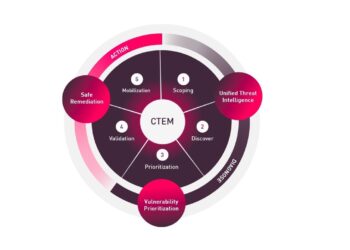Technology helps organizations enhance efficiency, agility, communication, customer experiences, productivity, etc. Many benefits are moving ahead with technology, but cybersecurity ignorance could be dangerous for the company’s reputation and goal. A Microsoft survey says approximately 35% of Indian SMBs spend 10% of their revenue on new technologies. Indian businesses also need to ensure proper cybersecurity training and awareness of their employees. Risk rises when organizations take standard security measures to secure their data, applications, network, and systems. An exclusive interview with Kallol Sil, CEO of Whizhack, explores how businesses can maintain cybersecurity and technology to drive innovations.
How Dangerous could it be if a technology-led organization cannot find a proper cybersecurity roadmap?
Kallol Sil: In today’s computerized world, new cybersecurity risks emerge every hour of every day. Organizations are becoming more vulnerable to cyber threats due to the increasing reliance on computers, networks, programs, social media, and data globally. Cybercrime is becoming a big business, and cyber risk is a global focus of organizations and governments. Financial and reputational risks are high if organizations don’t have an appropriate cybersecurity roadmap. The cost of an attack can be high, involving loss of data, fraud, and the cost of rebuilding systems, and should be analyzed against the cost of defending against such threats.
Global connectivity and increased use of cloud services with poor default security parameters mean the risk of cyber attacks from outside your organization is expanding. What could historically be addressed by IT risk management and access control now must be complemented by sophisticated cybersecurity professionals, software, and cybersecurity risk management.
It’s no longer enough to rely on traditional information technology professionals and security controls for information security. There is a clear need for threat intelligence tools and security programs to reduce your organization’s cyber risk and highlight potential attack surfaces. In addition, decision-makers need to make risk assessments when prioritizing third-party vendors and have a risk mitigation strategy and cyber incident response plan for when a breach occurs.
Data breaches have a massive, negative business impact and often arise from insufficiently protected data. External monitoring through third and fourth-party vendor risk assessments is part of any good risk management strategy. Without comprehensive IT security management, your organization faces financial, legal, and reputational risks.
How do Businesses set the balance between technology and cybersecurity to drive innovation?
Kallol Sil: With increasing economic pressures and exponential growth in technological innovations, businesses are increasingly relying on digital technologies to fulfill their innovation and value-creation agendas, at the same time, based on the increasing cybersecurity breaches, it is clear that the trustworthiness of many established and new technologies are not yet well addressed or appreciated as a fundamental core value in the new digital economy.
Consequently, companies are aggressively pursuing strategies to increase the cybersecurity of their existing and new digital assets. Unfortunately, many CIOs have to deal with both of these priorities simultaneously and find them to be frequently conflicting, creating tensions.
A practical recommendation for companies will be to take cybersecurity seriously and address it at the industry, company, and technology levels, as that will position them to not only protect the existing value of their company but create new value as cybersecurity gets built into all new innovative technologies at the foundational levels.
NASSCOM reports India lacks skilled cybersecurity professionals despite being the world’s biggest IT market. What could be the reason?
Kallol Sil: India’s cybersecurity workforce shortage is 9 percent higher than the global average. Due to insufficient funding and a crunch of skilled resources, the availability of a skilled workforce does not live up to the demand in the industry.
As thousands of companies are looking to hire cybersecurity professionals, the gap in the availability of a skilled workforce has widened. Considering that India is home to several IT companies and addresses the technology requirements of several global companies, this shortage of skilled cybersecurity workforce can be devastating in the long term.
Thus, there is an immediate need for India to invest more in cybersecurity learning and awareness on a war footing to address the mismatch in the demand and supply of cybersecurity professionals.
How is Whizhack working on combating the continuously evolving cybercriminals and their sophisticated attacking methods?
Kallol Sil: At WhizHack, we are building a vertically integrated approach to cybersecurity. By creating a sustainable product development ecosystem, service deployment, and workforce training for empowering people and organizations.
Our Products capture attack data from millions of sensors on our unique, globally patented, industry-specific threat intelligence platform. It merges deep packet inspection of over 600 fields with traditional signature-based methods. This helps us learn immensely from real-world attacks. Additionally, we have an adaptable, multi-layer security system that uses signature, machine learning & deep learning algorithms to predict and mitigate zero-day attacks effectively. It is built with a vision of moving from an attack response mode to a proactive stance of threat prevention with very high accuracy and minimal latency. At WhizHack, we have developed industry-leading, affordable and efficient technologies for shielding businesses of all sizes. And with our consulting services portfolio can help you gain more expertise, improve your efficiency, and strengthen your security posture and cyber resilience. Besides the complete range of IT security services, we have specialized teams for OT security. We have also forged knowledge partnerships with none other than IIT and domain experts from Israel and the United States. This aligns with our mission to provide excellence and capacity building for future cyber defenders. In addition, we are building a growing community of ethical hackers, peers, and mentors who are strengthening the ecosystem by the day.
Also Read: Most Cybersecurity Issues Occur Due to Human Error: Awareness is Important To Prevent Attacks


















